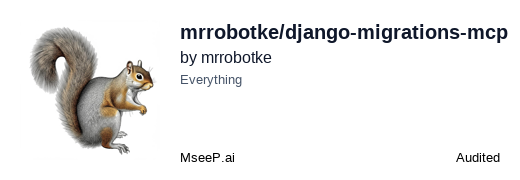A Model Context Protocol (MCP) service for managing Django migrations in distributed environments. This service wraps Django's migration commands and exposes them as MCP endpoints, making it easy to manage migrations across multiple services and integrate with CI/CD pipelines.
- Check migration status (equivalent to
showmigrations) - Create new migrations with validation (equivalent to
makemigrations) - Apply migrations with safety checks (equivalent to
migrate) - Additional validation and safety checks:
- Sequential migration order verification
- Conflict detection
- Dependency validation
- Safety analysis of migration operations
- Clone the repository:
git clone https://github.com/mrrobotke/django-migrations-mcp.git cd django-migrations-mcp- Install dependencies:
pip install -r requirements.txtSet the following environment variables:
export DJANGO_SETTINGS_MODULE="your_project.settings" export MCP_SERVICE_PORT=8000 # Optional, defaults to 8000- Directly with Python:
python -m migrations_mcp.service- Using Docker:
docker build -t django-migrations-mcp . docker run -e DJANGO_SETTINGS_MODULE=your_project.settings \ -v /path/to/your/django/project:/app/project \ -p 8000:8000 \ django-migrations-mcp- Show Migrations:
from mcp import MCPClient client = MCPClient() migrations = await client.call("show_migrations")- Make Migrations:
result = await client.call("make_migrations", { "app_labels": ["myapp"], # Optional "dry_run": True # Optional })- Apply Migrations:
result = await client.call("migrate", { "app_label": "myapp", # Optional "migration_name": "0001", # Optional "fake": False, # Optional "plan": True # Optional })Example GitHub Actions workflow:
name: Django Migrations Check on: pull_request: paths: - '*/migrations/*.py' - '*/models.py' jobs: check-migrations: runs-on: ubuntu-latest steps: - uses: actions/checkout@v2 - name: Set up Python uses: actions/setup-python@v2 with: python-version: '3.11' - name: Install dependencies run: | pip install -r requirements.txt - name: Start MCP service run: | python -m migrations_mcp.service & - name: Check migrations run: | python ci/check_migrations.pyExample check_migrations.py script:
import asyncio from mcp import MCPClient async def check_migrations(): client = MCPClient() # Check current status migrations = await client.call("show_migrations") # Try making migrations result = await client.call("make_migrations", {"dry_run": True}) if not result.success: print(f"Error: {result.message}") exit(1) print("Migration check passed!") if __name__ == "__main__": asyncio.run(check_migrations())pytest migrations_mcp/tests/The project follows PEP 8 guidelines. Format your code using:
black migrations_mcp/ isort migrations_mcp/MIT License. See LICENSE file for details.
- Fork the repository
- Create your feature branch (
git checkout -b feature/amazing-feature) - Commit your changes (
git commit -m 'Add amazing feature') - Push to the branch (
git push origin feature/amazing-feature) - Open a Pull Request
The project includes a docker-commands.json file that provides structured commands for different deployment scenarios. You can use these commands directly or parse them in your scripts.
- Redis MCP Server
# Run Redis MCP server docker run -i --rm mcp/redis redis://host.docker.internal:6379- Django Migrations MCP Server
# Basic setup docker run -d \ --name django-migrations-mcp \ -e DJANGO_SETTINGS_MODULE=your_project.settings \ -e MCP_SERVICE_PORT=8000 \ -v /path/to/your/django/project:/app/project \ -p 8000:8000 \ django-migrations-mcp # With Redis integration docker run -d \ --name django-migrations-mcp \ -e DJANGO_SETTINGS_MODULE=your_project.settings \ -e MCP_SERVICE_PORT=8000 \ -e REDIS_URL=redis://host.docker.internal:6379 \ -v /path/to/your/django/project:/app/project \ -p 8000:8000 \ --network host \ django-migrations-mcp- Development Environment
# Using docker-compose docker-compose up -d --build- Testing Environment
# Run tests in container docker run --rm \ -e DJANGO_SETTINGS_MODULE=your_project.settings \ -e PYTHONPATH=/app \ -v ${PWD}:/app \ django-migrations-mcp \ pytest- Production Environment
# Production setup with health check docker run -d \ --name django-migrations-mcp \ -e DJANGO_SETTINGS_MODULE=your_project.settings \ -e MCP_SERVICE_PORT=8000 \ -e REDIS_URL=redis://your-redis-host:6379 \ -v /path/to/your/django/project:/app/project \ -p 8000:8000 \ --restart unless-stopped \ --network your-network \ django-migrations-mcpYou can parse and use the commands programmatically:
import json import subprocess # Load commands with open('docker-commands.json') as f: commands = json.load(f) # Run Redis MCP server redis_config = commands['mcpServers']['redis'] subprocess.run([redis_config['command']] + redis_config['args']) # Run Django Migrations MCP server django_config = commands['mcpServers']['djangoMigrations'] subprocess.run([django_config['command']] + django_config['args'])- Development Network
docker network create mcp-dev-network- Production Network
docker network create --driver overlay --attachable mcp-prod-networkThe service exposes several endpoints that can be accessed via curl or any HTTP client:
- Show Migrations
curl -X POST http://localhost:8000/mcp \ -H "Content-Type: application/json" \ -d '{"method": "show_migrations"}'- Make Migrations
curl -X POST http://localhost:8000/mcp \ -H "Content-Type: application/json" \ -d '{"method": "make_migrations", "params": {"apps": ["your_app"]}}'- Apply Migrations
curl -X POST http://localhost:8000/mcp \ -H "Content-Type: application/json" \ -d '{"method": "migrate", "params": {"app": "your_app"}}'